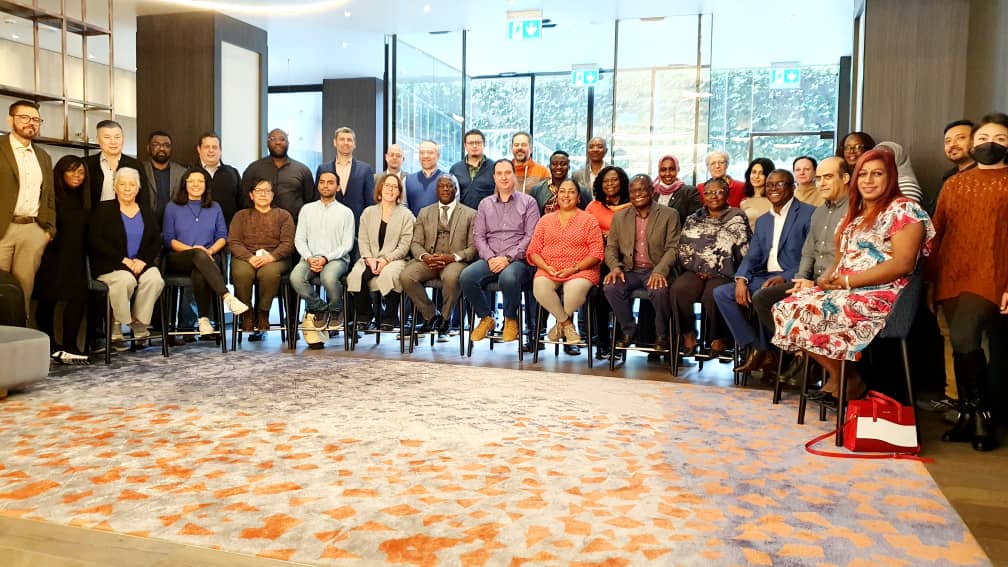The IMG Retreat in Montenegro: Strengthening Collaboration, Engagement, and Impact for 2024
- October 27, 2023
- Africa / African Constituencies / IMG / Implenter group
- By Armelle Nyobe
- Read in French

The Global Fund Implementer Constituencies Group (IMG)organised a retreat in Montenegro for Board Members (BMs) and Alternate Board Members (ABMs) from October 5-7, 2023. The main objectives of the retreat were to define the Implementer Constituencies Group (hereinafter referred to as IMG in the short-form) in terms of its mode of work, role and representative nature, engage in team-building exercises to improve understanding among delegation members and participate in information learning and knowledge management through site visits.
The African constituencies were represented by Dr. Mbungani, Dr Charles Mwansambo, both WCA Board member and ESA alternate Board Member, and Mrs. Margaret Mundia, ESA Communication Focal Point. Their attendance was to share the concerns of our implementers’ countries; Africa bears the bulk of the disease burden (over 70% HIV, 24% TB & over 95% Malaria) and the Global Fund invests about 73% of its resources to fight HTM in Africa and operates in very fragile countries.
The topics covered during the retreat included engagement and linkages to other spaces, the importance of objectivity in presenting issues affecting the represented people, exploring the possibility of building consensus, and the representation and engagement of the IMG. The discussions also included the uniqueness of issues, utilizing a collective voice, and employing innovative mechanisms for engagement throughout the year (not just confined to Board Meetings). Additionally, critical issues to be advocated for and the pros and cons of carving spaces at the Board Meetings for IMG engagement were explored.
The IMG is actively looking ahead to ensure strategic planning and effective engagement for the upcoming year. There are several key considerations on the table that will shape the way forward for the IMG in 2024. Let’s explore these considerations in more detail:
Mapping Activities and Engagement Spaces:
One crucial step in planning for 2024 is a comprehensive mapping of activities and engagement spaces. It is important to identify the key initiatives and events that the IMG will be involved in throughout the year. The question arises whether this mapping can be accomplished during the IMG meeting scheduled for November. This discussion will help establish a clear roadmap for the IMG’s activities and ensure effective coordination.
Contributing to Constituency Meetings:
Mapping out constituency meetings for 2024 and determining how the IMG can collectively contribute to each delegation’s meetings is another vital consideration. The IMG can provide valuable inputs and support to different delegations by actively engaging in these meetings. This collaborative approach will strengthen the IMG’s role as a representative body of its constituencies and facilitate meaningful contributions to each delegation’s objectives.
Establishing Working Groups based on Disease Expertise:
To enhance the IMG’s effectiveness, establishing specialized Working Groups based on disease expertise is being considered. These groups would focus on key areas such as HIV, TB, and malaria. By leveraging the knowledge and experience of experts within the IMG, these Working Groups can effectively address specific challenges and drive impactful change in each disease area.
Increasing Calls with a Specific Focus:
An idea on the table is to increase the number of calls by the IMG that concentrate on specific topics. These focused calls can create knowledge-sharing opportunities and collaboration among IMG members. They may be organized either regionally or based on disease areas. The IMG can strengthen its collective expertise and amplify its impact by sharing insights, best practices, and lessons learned.
Exploring Joint Sessions and Engagement with Donors:
To enhance partnerships and resource mobilization, exploring increased joint sessions and engagement with donors is being considered. By engaging donors directly in joint sessions, the IMG can foster greater alignment, share its work, and advocate for resources to address better the challenges faced in various disease areas. This raises questions regarding whether this responsibility should be undertaken by the IMG Leadership and what value the entire IMG brings to such engagements.
By actively addressing these key points, the IMG can strengthen its effectiveness, collaboration, and impact as it works towards its health and disease prevention goals. As the IMG looks to the future, these will be crucial in shaping its direction and priorities for 2024.
To enhance the clarity and organization of the given statements, a dedicated team was formed to collaborate on the draft ‘Way of Working Document,’ with the goal of finalizing it for ratification at the Global Fund Board Meeting in November.
Armelle Nyobe



This is a precise and thought-provoking piece. However, its very important to note that we must bring up strongly the integration of the disease programs especially HTM supported by Global Fund and for other less funded programs to leverage on this available fund. Furthermore, effective and efficient coordination in key as the diseases are under the supervision of the Directorate of Public Health. Unfortunately, there has been fragmentation of the disease interventions under the Department of Public Health and disease control in my developing countries giving room to poor coordination, vertical implementation and duplication of interventions and wastages of meager available resources. The Directors of Public Health and disease Programs should be empowered to integrate the disease programs. This must be deliberately looked into even in the midst of huge gaps in the human resources in most of the African countries.